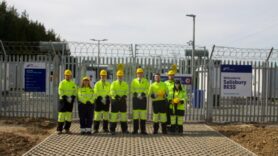Guest blogger, Richard Jemmett, npower’s Head of Business and Social Housing, shares some insight into the barriers facing many businesses when it comes to building the case for implementing energy efficiency.
Building a more logical case for energy efficiency
“Investment in energy efficiency does not happen to the extent a rational economist would expect,” noted a report released last month by the Regulatory Assistance Project in Berlin, entitled Paving the Way Towards an Energy Efficient Europe. It made me smile as while it’s true, the issue is clearly far more complex – like the people that populate them, the way companies behave is not always logical at first sight.
The logical argument goes something like this. If you could save £1000 every year by doing something simple that wouldn’t take up much of your time, you’d do it, right? Most people would say yes immediately. And yet, if we apply this scenario to saving energy in a business – even if we stick a couple of noughts on that £1000 figure – the answer often isn’t so positive, or at least the action needed isn’t prioritised over business as usual. No wonder those economists are confused.
In a climate where energy prices are rising – not just because of commodity costs but also due to growing levels of regulatory levies – there are clear incentives for cutting bills by reducing consumption. And there are plenty of ways to do so – from educating staff to switch off lights and computers to investing in more energy-efficient equipment and controls. But even when the financial rationale looks clear – for example, installing daylight and occupancy lighting sensors that reduce electricity use by as much as 70% – many businesses still find it hard to create successful investment cases. So why is this?
My contention is that, typically, the investment required in a business’s infrastructure is not aligned with that business’s desired outcomes. What do I mean by this? Let me give you a simple example using insulation to explain.
If you insulate a key business site, what is likely to happen? How about creating a warmer environment that’s nicer to work in and more pleasant for customers to visit. Come summer, it will also ensure your building stays cooler, so again creating a more comfortable place to work and visit. We should, of course, not forget that when you get your energy bill, it will be lower, so you’ll be spending less. And if you calculate the carbon footprint of your business – which is likely if you’re a large energy user – that too will be reduced as you’ll be consuming less energy. So there are environmental benefits too.
So when creating a case to justify insulating a building, look further than just the value of the energy and carbon saved. Creating a more comfortable place to work in across the seasons and a nicer environment for customers to visit should ultimately deliver measurable employee and customer benefits. These are likely to impact your bottom line too, whether it be through less employee sickness or higher customer sales, delivering a much more attractive proposition.
I appreciate this is a pretty simplistic example. But hopefully the message is clear – if you can identify the broader business outcomes and tie these in with the return on investment from energy savings, you get a far stronger case for investment overall.
Let me give you another example involving a real business customer who manages more than 350 garage forecourts. This company wanted to save on energy costs, so were already pretty motivated to invest in the necessary equipment required to deliver long-term cost reductions. But they were also conscious of enhancing the environment for their tenants. Forecourt illumination is often required 24 hours a day, so we advised installing longer-lasting, low-energy LED lighting. Not only did this cut maintenance costs and reduce energy bills by around 90% – delivering annual savings of £260k – it also contributed to the wider business outcomes, helping to create a more pleasant, safer-feeling environment for customers and staff that resulted in higher fuel sales and happier tenants.
If you’re working in the energy arena and are looking to make savings, or want to build a stronger business case for doing so, then my suggestion is to engage some professionals who can offer impartial advice and share best practice from the other businesses they’ve worked with. (To contact our own Energy Services team, visit www.npower.com/enlightenedenergy or email them at [email protected].) A focus on meeting measurable business outcomes brings dividends to all.
After all, in today’s economic climate, removing any barrier to saving money makes sound business sense, especially if it also delivers other benefits. What’s more, it’s likely to keep the most rational of economists happy too.





